CAT Questions | CAT LR DI
Logical Reasoning for CAT | LR: Sequences
CAT DI LR section has become increasingly tough beginning from 2015. However, Understanding the basics of Bar graphs, Pie Charts, Multiple graphs, Line Graphs etc forms an integral part of solving tougher CAT level DI LR questions for the CAT Exam. This question is from Logical Reasoning for CAT - Sequencess.
Logical Reasoning for CAT: Sequencess
Biscuits and Cookies
Five students, P, Q, R, S and T stand in a line in some order and receive cookies and biscuits to eat. No student gets the same number of cookies or biscuits. The person first in the queue gets the least number of cookies. Number of cookies or biscuits received by each student is a natural number from 1 to 9 with each number appearing at least once.
The total number of cookies is two more than the total number of biscuits distributed. R who was in the middle of the line received more goodies (cookies and biscuits put together) than everyone else. T receives 8 more cookies than biscuits. The person who is last in the queue received 10 items in all, while P receives only half as many totally. Q is after P but before S in the queue. Number of cookies Q receives is equal to the number of biscuits P receives. Q receives one more good than S and one less than R. Person second in the queue receives an odd number of biscuits and an odd number of cookies.
Question 1: Who was 4th in the queue?
⏳ Enroll Now for PGDBA – Special Offer Available
2IIM : Best Online CAT Coaching.
Video Explanation
Best CAT Coaching in Chennai
CAT Coaching in Chennai - CAT 2022
Limited Seats Available - Register Now!
Explanatory Answer
Method of solving this Question on Logical Reasoning for CAT
General Solution
Let us make the some inferences first, then we will build the table and work from there.
Number of cookies or biscuits received by each student is a natural number from 1 to 9 with each number appearing at least once. – Each number from 1 to 9 appears once, with one number appearing twice.
T receives 8 more cookies than biscuits – T receives 9 cookies and 1 biscuit The person who is last in the queue received 10 items in all, while P receives only half as many totally – P receives only 5 items totally. Either 1 + 4 or 2 + 3 in some order. Number of cookies Q receives is equal to the number of biscuits P receives – This is the number that appears twice. So, the number that appears twice is either 1, 2, 3 or 4. R who was in the middle of the line => R is third.
The total number of cookies is two more than the total number of biscuits distributed. => This is a very vital clue. This tells us that the total number of cookies and biscuits are both odd or both even. Importantly, the total number of cookies + total number of biscuits is an even number.
1+ 2 + 3 + … 9 = 45. So, if the total is an even number, the number that repeats should be odd. We know that the number that appears twice has to be 1, 2, 3 or 4. So, we can further narrow this to 1 or 3. Further, we know that T receives 9 cookies and 1 biscuit. So, the number that repeats is 3. So, number of cookies Q gets = number of biscuits P receives = 3. Number of cookies P receives should be 2.
The overall total number is 48. Total number of cookies = 25, total number of biscuits = 23. Let us consolidate the data we have.
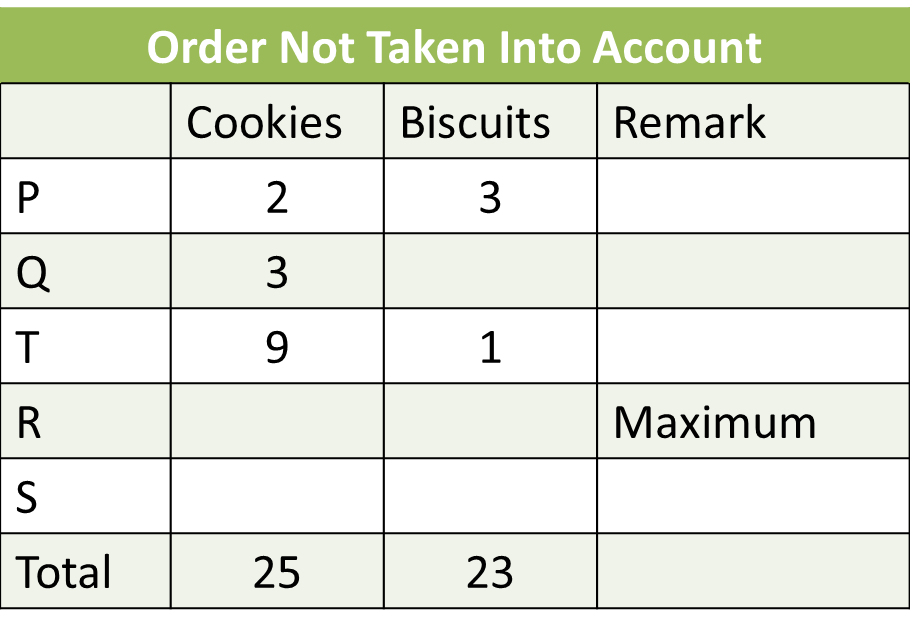
The person first in the queue receives the least number of cookies. Or, P should be first in the queue. R is third. Q is before S in the queue.
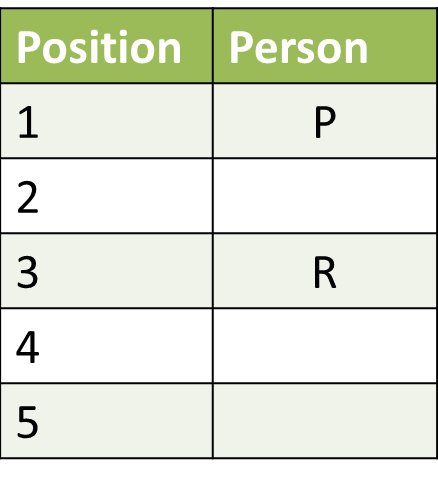
Q receives one more good than S and one less than R. T receives 10 and P receives 5. So, Q, R and S together should receive 48 – 15 = 33. Q receives one more good than S and one less than R. Or, Q should receive 11, R should receive 12 and S should receive 10. Either S or T should be last in the queue.
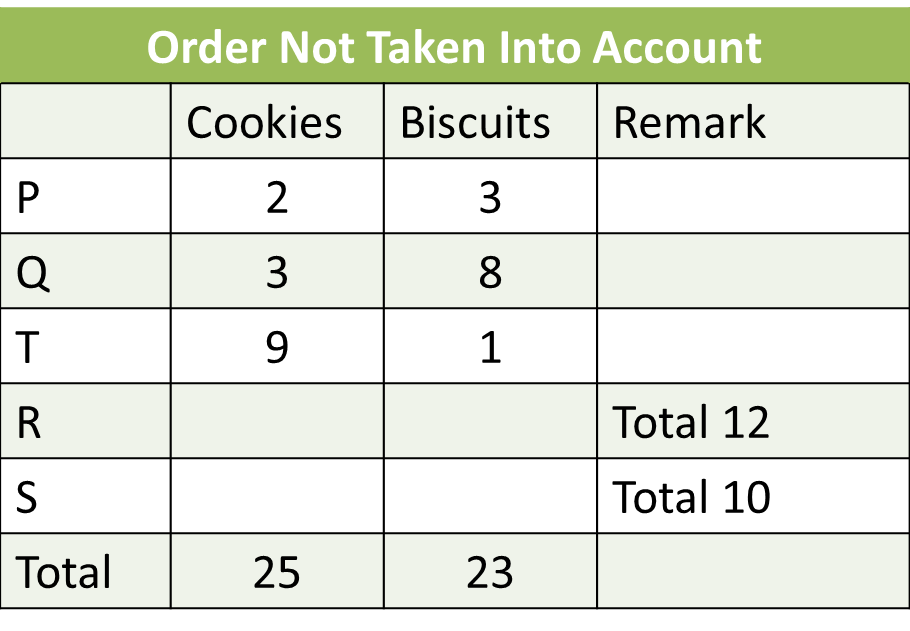
Q is before S in the queue. Or Q is not last. Person second in the queue receives an odd number of biscuits and an odd number of cookies. Q receives 3 cookies and 8 biscuits, so Q is not second. So, Q has to be 4th, Q is before S, so S is last. T is second.
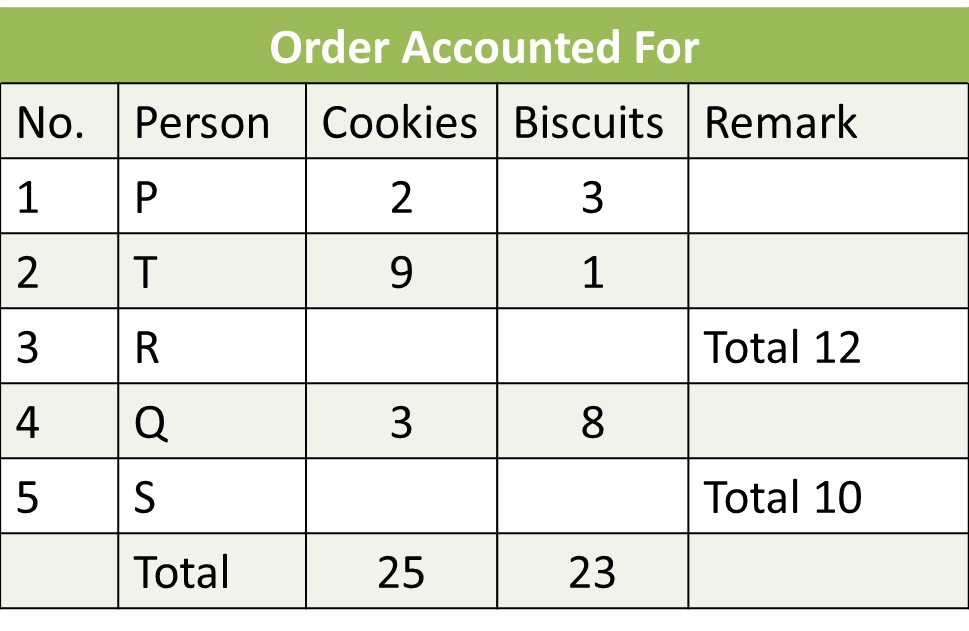
The numbers missing are 4, 5, 6 and 7. R should have received 5 and 7. S should have received 4 and 6. Since the total numbers should also match, we can arrive at two possibilities overall.
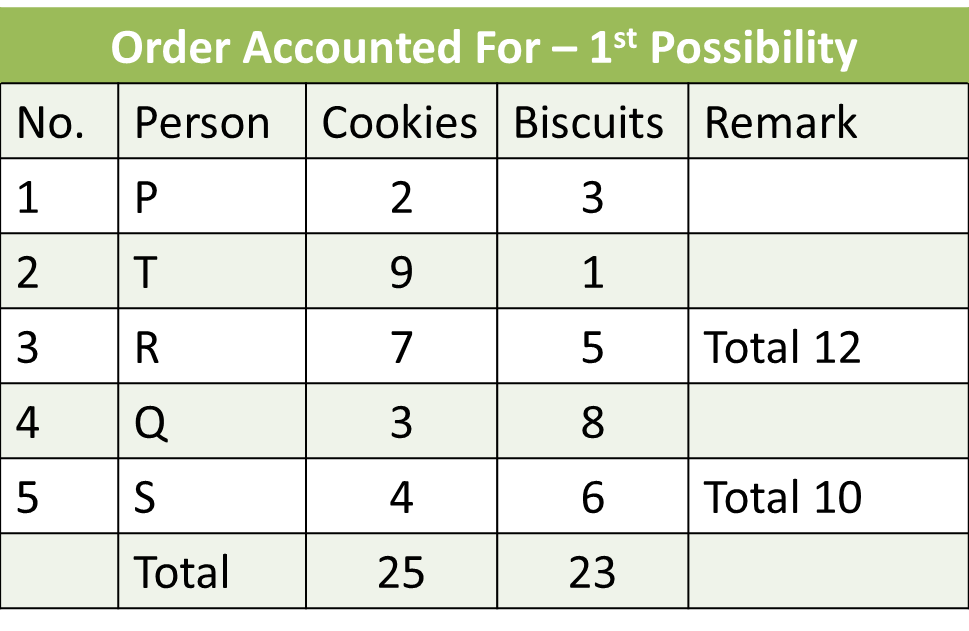
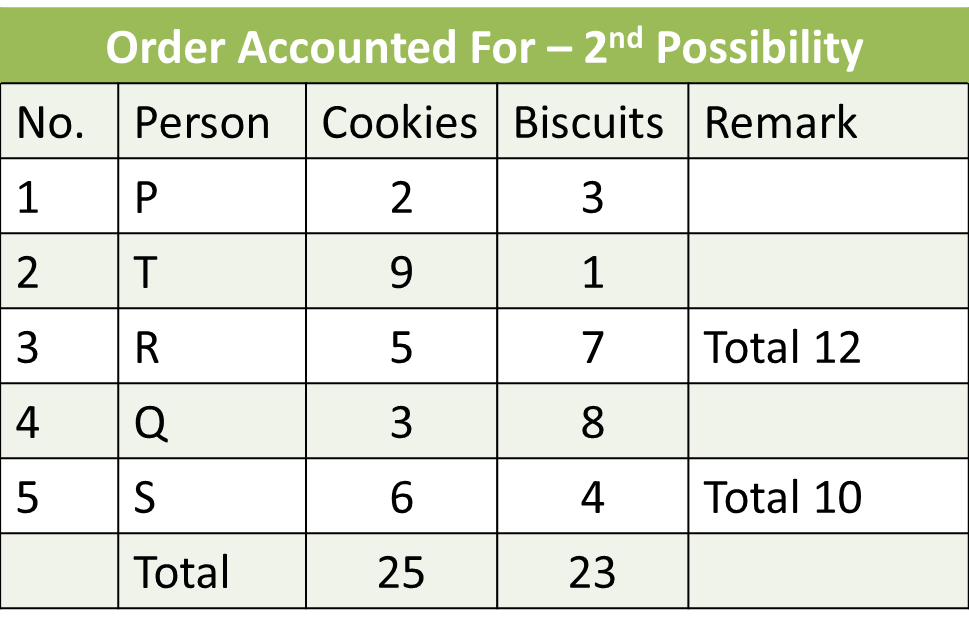
Though there are two possibilities, Q is fourth in both cases.
The question is "Who was 4th in the queue?"
Hence, the answer is "Q was 4th".
CAT Preparation Online | Logical Reasoning for CAT questions Videos On YouTube
CAT Preparation Online | Data Interpretation for CAT questions Videos On YouTube
CAT Questions | CAT Quantitative Aptitude
CAT Questions | CAT DILR
CAT Questions | Verbal Ability for CAT
Copyrights © All Rights Reserved by 2IIM.com - A Fermat Education Initiative.
Privacy Policy | Terms & Conditions
CAT® (Common Admission Test) is a registered trademark of the Indian
Institutes of Management. This website is not endorsed or approved by IIMs.
Where is 2IIM located?
2IIM Online CAT Coaching
A Fermat Education Initiative,
19/43, MG Chakrapani St,
Sathya Garden, Saligramam, Chennai 600 093
How to reach 2IIM?
Phone: (91) 44 4505 8484
Mobile: (91) 99626 48484
WhatsApp: WhatsApp Now
Email: prep@2iim.com



